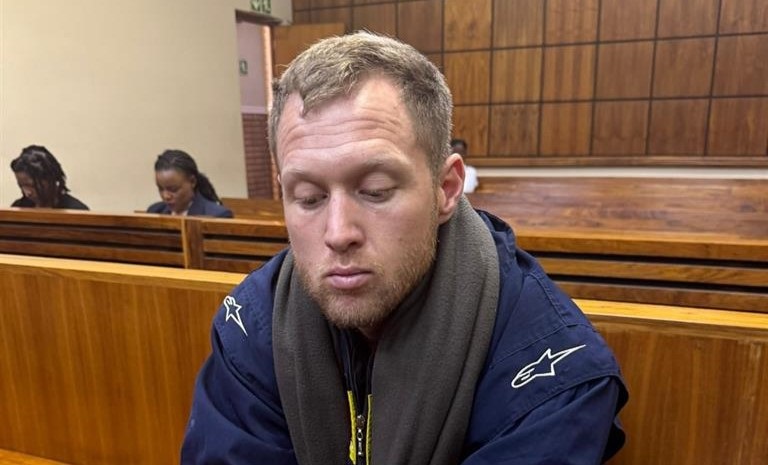Advocacy group Women and Men Against Child Abuse (WMACA) is urging South Africans to engage in a critical discussion on the language surrounding child sexual abuse material, following the arrest of 35-year-old Darren Wilken. Wilken was apprehended in Midrand after a raid uncovered a disturbing array of electronic devices containing child sexual abuse material, significant sums of cash, and drugs, revealing his involvement in a transnational sex crime syndicate. His second court appearance is scheduled for January 28 at the Randburg Magistrate’s Court.
In light of Wilken’s arrest, WMACA has launched a powerful campaign titled “Stop Calling it Child Pornography,” aimed at changing the terminology used when referring to such crimes. Luke Lamprecht, the group’s advocacy manager, emphasized the importance of reframing the way we talk about these horrors. “We must stop calling this ‘child pornography.’ That term minimises the horror of what children go through. This is not about children being sexualised; it is about them being brutalised,” Lamprecht said. He further explained that using the term “pornography” gives the false impression that children somehow consented to these acts, which is a gross misrepresentation of the truth. “Children cannot consent to such sexualised acts. We must challenge this language, which normalises the eroticisation of children and diminishes the severity of sexual abuse and exploitation,” he added.
Miranda Jordan, the founding director of WMACA, echoed these sentiments and warned that cases like Wilken’s represent a much larger and more sinister global problem. “This is not about images or videos — it is about real children who have been subjected to unimaginable suffering and exploitation,” Jordan said. She pointed out the chilling reality that once these images or videos are made, the trauma for the victims becomes permanent, as the digital content can exist indefinitely across various platforms and devices. The victims’ pain is perpetuated by the continuous circulation of these materials, making it impossible for them to escape their past trauma.
Jordan also raised concerns about the adequacy of South Africa’s law enforcement resources to combat cybercrime, particularly in cases involving child sexual abuse and exploitation. “Cybercrime is complex, and law enforcement agencies need to be equipped and resourced to address it,” she stated. The vastness of the digital world and the interconnectedness of criminal syndicates complicate the identification of victims and perpetrators, making justice and rehabilitation for these children more difficult to achieve.
The arrest of Darren Wilken has highlighted the global scale of child exploitation. Each file discovered during the raid represents a child whose life has been marred by suffering and abuse. “These children are not just statistics,” Jordan said. “They are human beings whose lives have been irreversibly harmed.” The existence of these materials on cloud data and personal devices means the cycle of exploitation and trauma for the victims is endless.
WMACA also drew parallels between Wilken’s arrest and the infamous Operation Cloud 9, which began in 2015 and resulted in the arrest of William Beale, the first South African implicated in a global child abuse ring. This operation, led by Interpol, uncovered a network of cyber-criminals trafficking in child abuse material across multiple countries. In one of the most horrifying aspects of Cloud 9, Beale was found to be distributing images involving the rape of newborns. Chief Inspector Tim van Eester from Antwerp, Belgium, described the materials uncovered in the operation as “pure evil,” a sentiment that remains true today, as the Wilken case mirrors these past events.
“The Wilken case follows a disturbingly similar pattern, raising serious concerns about the continued operations of global sex crime syndicates exploiting children for profit,” Jordan commented. She warned that these syndicates, which operate with alarming efficiency, continue to thrive despite global efforts to eradicate them. “The same patterns, same methods, and same horrifying exploitation are resurfacing, exposing an ongoing failure in global child protection efforts.”
According to WMACA, the arrest of Wilken is part of a disturbing trend, with 21 arrests in the past two years related to child sexual abuse materials in South Africa. The country is emerging as a critical battleground in the fight against online sexual exploitation of children. The group argues that while Wilken’s arrest is a step in the right direction, it is only the beginning of a much longer struggle. “The true measure of justice will be in rescuing the victims and ensuring those responsible face the full force of the law,” Jordan concluded.
As the case progresses, WMACA remains steadfast in its call for a shift in public discourse and a more robust global response to the rampant exploitation of children. The fight is far from over, but it is one that requires not only legal action but a fundamental shift in how we view and address child sexual abuse in the digital age.
